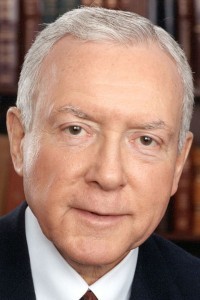Orrin Hatch Uses Corporate Cash To Fend Off Tea Party Challenge
 Last night, incumbent Senator Orrin Hatch (R-UT) easily bested a tea party-backed primary challenge from Dan Liljenquist, getting 66% of the vote to his 33%.
Last night, incumbent Senator Orrin Hatch (R-UT) easily bested a tea party-backed primary challenge from Dan Liljenquist, getting 66% of the vote to his 33%.
Hatch’s win came on the heels of a huge fundraising advantage. He raised $9,709,238 and spent $10,151,378 during the campaign cycle, while Liljenquist raised $778,362 and spent only $614,638.
Interestingly, 40 percent of the incumbent senator’s funds came from Political Action Committees (PACs), while Liljenquist raised virtually no PAC cash. The only strong outside interest group backing the challenger was FreedomWorks, but that group spent only roughly $900,000 on his behalf.
Corporations and K Street in particular lined up to support Hatch, who has been a strong supporter of these interests in Washington. Take the music industry, for example. He is the Senate’s third-largest recipient of campaign funds from the industry and he was a strong backer of its top legislative priority earlier this year, the draconian anti-piracy bill Preventing Real Online Threats to Economic Creativity and Theft of Intellectual Property Act (PIPA), telling a crowd at a town hall that he was a “prime co-sponsor” of the legislation.
Although he later pulled his support for the bill after citizen outrage, he was still awarded generously in the run-up to the introduction of the bill. For example, the PAC of entertainment industry giant Sony gave him $6,000 from the end of 2011 to the beginning of 2012, as PIPA was being prepped for a vote. He also received a $5,000 check from the Motion Picture Association of America the month before PIPA was scheduled to be voted on.
Hatch was also rewarded by corporations for his work to stop and then undermine the Dodd-Frank financial regulation bill. As the top Republican on the Senate Finance Committee, he demanded in April 2011 that regulations be delayed until other nations adopt simular measures. Roughly two weeks before he made this demand, the American Bankers Association wrote Hatch a $5,000 check (the same day a year later, as Hatch’s primary was opposing, Wells Fargo PACs gave $13,500).
These are just small samplings of the corporate and K Street backing that Hatch received in his primary. The message of his re-election is simple: if you do the bidding of corporate America, it will ensure that you are re-elected. Hatch raised more money from corporations than Liljenquist — who took virtually no PAC cash — had in his entire campaign. That did not bode well for the tea party, and it does not bode well for democracy, either.